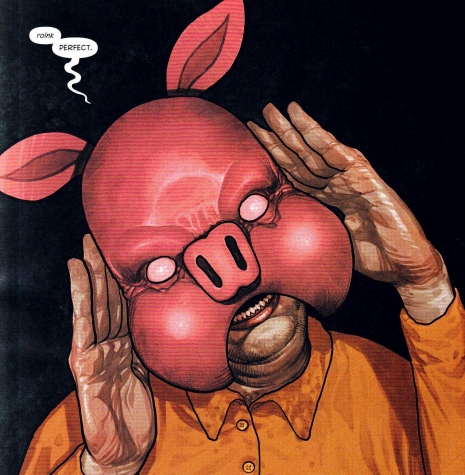
A few weeks back, I posted a long piece with several multimedia files urging our readers—who for some reason seem to have high IQs and amazingly good taste in music—to tune into the very specific wavelength of Momus, the multi-hyphenate Scottish songwriter, performer, novelist, citizen of the world, and trickster wit cult figure who is sadly still somewhat obscure despite putting out some 30 year’s worth of exceptional music.
If you’re interested, then I hope you’ll read “Poison boyfriend. Tender pervert. Pubic intellectual. Timelord. A brief introduction to Momus,” but I saved one song—my very most favorite Momus number I reckon—for today, Halloween, as it seems the most appropriate.
“Pygmalism” was originally written for Japanese singer Kahimi Karie and appeared on her Momus-produced EP Journey To The Centre Of Me in 2000. The song is written from the point of view of a female who is mind-controlled by an evil male character based on Professor Henry Higgins, the uptight perfectionist who trains Cockney flower girl, Eliza Doolittle to be a “propa lady” in George Bernard Shaw’s stage play Pygmalion. The fictional control freak Higgins is the same character played by Rex Harrison in My Fair Lady on Broadway and in George Cukor’s 1964 movie musical, but the story’s origins come from ancient Greek mythology and Ovid’s narrative poem Metamorphoses where the sculptor Pygmalion falls in love with one of his creations, which then comes to life.

Whereas Rex Harrison’s Oscar-winning Higgins was merely pushy, in Momus’s retelling of the Pygmalion myth, Herr Professor Pyg is one evil motherfucker:
I only exist for Herr Professor Pyg
As a figment of his huge imagination
Mirror, mirror on the wall
Who is the villain of them all?
The mirror will answer back ‘Narcissus’
I’m your blessing but not your possession
Even what you make can drag you downSometimes in the night
I sing the songs Professor Pyg has taught me
Cutting up with scissors
All the stupid sexy clothes he’s bought meThough my eyes are haunted
Though my memories have been implanted
No ancestors you can trace
An accent from no place invented
The eerie music playing behind this is the soundtrack of a deeply disturbing delirium reminiscent of a particularly evil-sounding Soft Cell track with some DNA swiped from David Bowie’s “All the Madmen.” Karie’s little girl singsong Japanese whisper is the battery acid icing on a cake that will make your skin peel off:
But as cool as her take on the song is, I actually far prefer the Momus version, which appeared on his album Folktronic in 2002. It’s got the same instrumental backing track (recorded with The Dufay Collective) but Nick Curry’s vocal is just so much more demented sounding than Kahimi’s is and it takes his composition to an even stranger, and much more perverse place. I mean, her blank vocal is pretty fucking out there to begin with, but try this multi-tracked chorus of very bad things on for size:
It’s easy to see how “Pygmalism” would have inspired comics great Grant Morrison. He’s a huge Momus fan and I can only imagine him playing it on repeat dreaming up the character of Lazlo Valentin AKA Professor Pyg. Wanting to come up with a “genuinely disturbed and disconnected” Batman supervillain was his goal and he achieved this and then some with his revolting Pyg, one of the ugliest characters in all of comics history—and one I hope to see on Gotham soon, I might add—who debuted in the auspicious issue #666 of Batman.
Professor Pyg melts doll masks—Cartoon Head-style, permanent-like—onto his brainwashed, lobotomized, dress-wearing “Dollotrons,” unlucky victims who he seeks to surgically “perfect.” He’s also the inventor of a mind control drug that he sells to the mob to use on prostitutes. The meat cleaver-baring madman leader of the Circus of Strange is not someone who you ever want to come in contact with under any circumstances. No good will come of it!
DC Direct released a fantastic Professor Pyg poseable figurine (mine’s staring back at me as I type this) and the vile serial killer fights the caped crusader in the Batman: Arkham Knight videogame.
More Professor Pyg after the jump…















